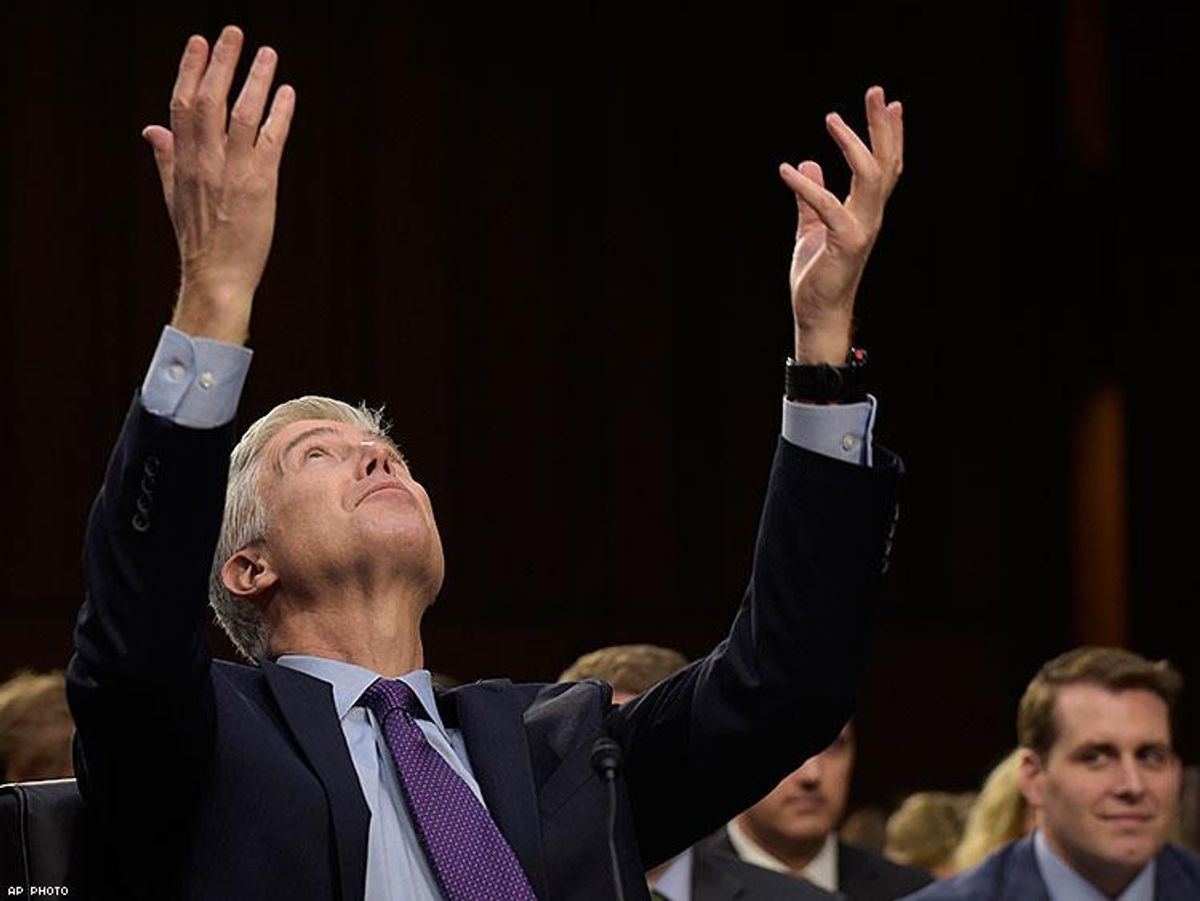Senate Democrats will try to block Neil Gorsuch's confirmation to the Supreme Court, their leader in the chamber, New York Sen. Chuck Schumer, said today.
Schumer said he will use the filibuster, which in modern usage means requiring 60 votes to end debate on the nominee and proceed to a vote on confirmation, The Washington Post reports. But Republicans, who hold a majority in the Senate, could change the rules to end debate with a simple majority of votes, 51.
Schumer struck back against the possibility of a rule change, the Post reports. "If this nominee cannot earn 60 votes -- a bar met by each of President Obama's nominees and George Bush's last two nominees -- the answer isn't to change the rules. It's to change the nominee," he said.
Speaking in the Senate, Schumer told his colleagues that Gorsuch "was unable to sufficiently convince me that he'd be an independent check" on Donald Trump and his policies. He later told the Post that Gorsuch is "not a neutral legal mind but someone with a deep-seated conservative ideology. He was groomed by the Federalist Society [a conservative legal group] and has shown not one inch of difference between his views and theirs."
Two other Democratic senators, Thomas Carper of Delaware and Bob Casey of Pennsylvania, said they would support the filibuster, the Post reports. Bernie Sanders of Vermont, previously an independent but now a Democrat, has said he also opposes Gorsuch's confirmation, CNN reports. No Democrat has yet come out in favor of Gorsuch.
To clear the 60-vote hurdle would require eight Democrats or independents to join the Senate's 52 Republicans in voting to end debate. There are 41 Democrats in the chamber and one independent, Angus King of Maine, who caucuses with the Democrats.
Gorsuch, currently a judge on the U.S. Court of Appeals for the 10th Circuit, based in Denver, is in his fourth and final day of confirmation hearings before the Senate Judiciary Committee. Democrats on the committee have pressed him on whether he believes in a constitutional right to privacy, which undergirds the Supreme Court's rulings on marriage equality, sodomy laws, and abortion rights, and they appear unconvinced of his support, although he has also said the marriage equality and abortion rulings are strong precedents. Democrats also have expressed doubts about his support for workers' rights and voting rights.
Today's hearing did little to ease those doubts. It featured a variety of outside witnesses, drawn from people who favor Gorsuch's confirmation as well as those who oppose it. Some said that Gorsuch's reputation as a constitutional originalist, with the belief that the document's meaning is fixed, bodes ill for civil rights.
He has often "employed a dangerous brand of originalism" that ignores the effect of court decisions on people's lives, said Sarah Warbelow, legal director for the Human Rights Campaign. She cited his ruling against a transgender woman who was fired from her job because she refused to use the men's restroom, plus his decision in the Hobby Lobby case, where he held that even for-profit companies have the right to deny contraceptive coverage in employee benefit plans if it offends the owner's religious beliefs.
University of North Carolina law professor William Marshall said originalism is inappropriate in today's world. Democratic Sen. Mazie Hirono of Hawaii asked Marshall if originalism would have led the Supreme Court to the decisions it made in Loving v. Virginia, which struck down laws against interracial marriage; Obergefell v. Hodges, which invalidated laws against same-sex marriage; and Lawrence v. Texas, which struck down sodomy laws. In each case, Marshall said, the answer would be no.
Earlier this week, Gorsuch defended originalism in an exchange with Sen. Dianne Feinstein of California, the top Democrat on the Judiciary Committee. It does not turn on knowing what the framers of the Constitution intended when they wrote the document in the 18th century, but rather on an understanding of "what the words on the page mean," he said.
Nonetheless, there is concern that Gorsuch's record reflects a bias toward corporations and other powerful interests instead of workers and historically marginalized populations. Kristen Clarke, president of the Lawyers' Committee for Civil Rights Under Law, expressed worry today about how Gorsuch would rule on voting rights, saying it was troubling that he has refused to repudiate a comment by the late Justice Antonin Scalia, saying the reauthorization of the Voting Rights Act was the "perpetuation of racial entitlement."
Other witnesses said Gorsuch would be unlikely to uphold gun restrictions, abortion rights, or the rights of the disabled. Some pointed to a Supreme Court decision this week that reached a far different conclusion on the rights of disabled students to education than Gorsuch did in a similar case, in which he set a fairly low bar for what accommodations schools had to provide. The Supreme Court said schools should be held to a higher standard.
Several others, though, testified that Gorsuch is a fair and impartial judge, squarely in the legal mainstream. George Washington University law professor Jonathan Turley said he doesn't endorse all of Gorsuch's rulings, but the nominee should not be penalized for having a paper trail. Gorsuch is also a man of great intellect, Turley said. "To put it simply, Neil Gorsuch is as good as it gets," he said.

















































































